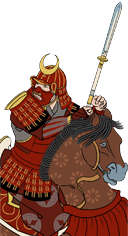
Basic Unit Statistics (can be modified by difficulty level, arts, skills, traits and retainers)
| Recruitment Cost | 900 | |
| Upkeep Cost | 200 | |
| Melee Attack | 9 | 25% |
| Charge Bonus | 25 | 50% |
| Bonus vs Cavalry | 15 | 50% |
| Melee Defence | 4 | 11% |
| Armour | 6 | 40% |
| Morale | 12 | 24% |
Strengths & Weaknesses
- Good against cavalry.
- Good against infantry.
- Higher than average speed.
- Weak against spears and naginata.
- Vulnerable to matchlocks.
Abilities
- Wedge Formation - Trained to charge in a wedge formation in order to better penetrate enemy formations
Requires
Description
These cavalry are a sword in their general's hand, ready to slice into a battle line.
Fire cavalry are best used as a shock formation, charging home into a melee to smash aside nearly all enemies. They are, of course, particularly effective if they can charge into the flanks or rear of an enemy unit. In melee they can be used against infantry and cavalry alike, although as with all horsemen they need to be carefully handled when in battle against naginata- or spear-armed troops. As with all melee units, they can be vulnerable to concentrated missile fire; historically this was amply demonstrated at the Battle of Nagashino when Oda musketeers shattered the Takeda cavalry attack. Until Nagashino, the Takeda clan were famed as horsemen and their cavalry were rightly feared by rival clans. In battle, an opening charge into the enemy became a standard Takeda tactic, and one which served them well. Enemies knew what was coming, and were often demoralised by the prospect. They were also often demoralised by the thought of facing Takeda Shingen, one of the few men who was the equal of Oda Nobunaga as a commander. Shingen was ably served by his cavalrymen, and by his "Twenty Four Generals", a group of close retainers. Some of them were rather closer than you might expect: Shingen's favourite, Kosaka Masanobu, was bound to the warlord by a love-pact sworn before the gods, that Shingen would not take another as lover. Such "shudo" arrangements between samurai were not uncommon, as it was expected that the parties would be loyal unto death to each other, a useful vow on the battlefield.
